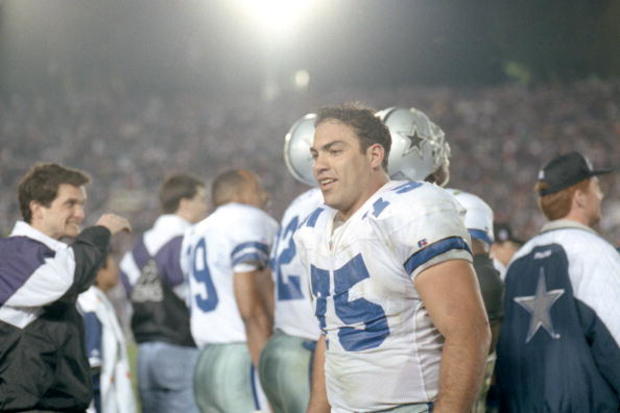DALLAS (CBSNewsTexas.com) – The Dallas Cowboys are the most valuable franchise in pro sports, in no small part because they have the largest Hispanic and Latino fan base in the NFL.
“It’s not about marketing, it’s about understanding your fan base and those are the ones you wanna touch and be important and be symbolic and I think they do a tremendous job of that,” said former Cowboys defensive tackle Tony Casillas.
George Rose/Getty Images
Casillas can still proudly display his two Super Bowl rings that came when he got traded from Atlanta to Dallas and became part of a dominant Cowboys defense.
Once in North Texas, he quickly learned his Mexican American heritage was not only appreciated, it was celebrated.
“People embraced the identity, ‘Hey you’re the beacon,’ and I’m like OK, it made me proud for people to say my name,” Casillas said. “When I came to Dallas and heard that, I was like, this is huge. They said, ‘Tony Casillas, you’re one of us.’ I was like, ‘Mucho gracias."”
That was not always the case. Raised in Tulsa, Casilla’s father tried to shield him from the prejudice often shown to the Hispanic and Latino community at that time.
“Being alienated from the culture, being Hispanic and Mexican, my dad wanted to keep our identity as Anglo because that was really hard and and I think one of things also not being able to speak Spanish,” Casillas said. “That started when I was younger and playing for the Cowboys. People had the expectation that you should be able to speak Spanish. I was like, no, I don’t, because it wasn’t cool to be brown in Oklahoma.”
Casillas also experienced racism in the locker room before he joined the Cowboys.
It weighed on him so heavily that when he filled out paperwork and saw ethnicity listed, what he checked off then and what he checks off now are two totally different things.
“When I was 18 or 19 and filled out an application, I would see Hispanic [but] I would check White,” he said. “That changed as I embraced my culture.”
A major turning cultural point of pride for Casillas is due to his grandparents.
They passed before they could see him become an All-American, win a national title at the University of Oklahoma and make the College Football Hall of Fame.
They never got to see him become part of America’s team, but their sacrifice to come to this country – particularly that of his grandmother – allowed Casillas and his family to live the American dream.
“I remember when my dad passed away, [he] told me [my grandmother] could read or write English,” Casillas said. “And I’m thinking, how did she do that?”
Casillas will forever be the face of Hispanic and Latino players to ever wear a Cowboys uniform. Before, that would’ve been a label he didn’t welcome. Now, he wouldn’t have it any other way.
“It’s been a long time since we won Super Bowls, but the people who looked up to you and you’re part of that culture and have pride in that,” Casillas said. “They don’t forget.”












